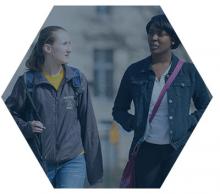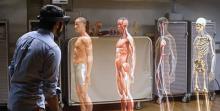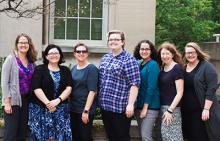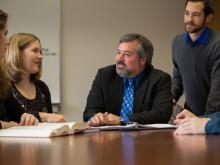Support Student Success and Enhance the Student Experience Progress Highlights and Success Stories
Information technology is ubiquitous in the lives of nearly all members of the CWRU community, and especially of students who are accustomed to constant connection—with one another, their studies and their play. In this context, students have high expectations of both the performance of technology on campus and its accessibility.
Success Stories
Is it possible to teach human anatomy without a cadaver? At CWRU, the answer is, YES! In fact, the new Health Education Campus will not accommodate the customary facilities for cadavers. UTech is supporting the Interactive Commons and the CWRU Department of Physics in the development and delivery of the solution—HoloLens and its holographic application. HoloLens is an augmented reality device that allows users to see 3D holograms projected in the context of the viewer’s actual surroundings.
With a holographic human body, instructors are no longer constrained by traditional methods of dissection. UTech instructional designers worked with faculty to explore alternative teaching methods and engaged in studies to measure the technology’s effectiveness. This approach will transform learning outcomes for all CWRU medical students.
For 18 months, the [U]Tech Teaching + Learning Technologies (TLT) team worked with CWRU student, faculty and staff advisory committees to:
- Test different learning management systems (LMS)
- Research all options
- Collect feedback from students and faculty via surveys and focus groups
After this expansive review, UTech officially selected Canvas as the best LMS for CWRU last September, with Canvas now being the only enterprise LMS used on campus.
The move to Canvas provides students and faculty with better, more streamlined tools for communication, interaction and learning. In its first full semester as the primary LMS for CWRU, more than 1,000 faculty and staff members created over 1,500 course sites in Canvas, a 16% increase over course sites in the former LMS last fall.
So Is Collaboration…
UTech worked successfully with faculty who teach from out-of-state locations to create a fully online, synchronous learning experience for students focused on nutrition. The team took one instructor through a full-service instructional design experience and launched the course in spring 2017.
It was the first time the faculty member had taught or taken a class online, thus UTech helped the instructor learn about how to translate lectures and the course approach into a successful online experience. UTech was able to provide advice on best practices for teaching online and guidance on how to shape the formerly in-person course into an engaging online experience for students.
Similarly, the team worked with faculty at the Jack, Joseph and Morton Mandel School of Applied Social Sciences to help turn the on-ground field study courses into a more effective online experience for students completing fieldwork. As a result of the team’s approach, a template for the entire set of field courses for the program was developed.
- Defined and evaluated student workspaces in an effort to develop a future technology plan for these areas—with the right workspace, students succeed
- Upgraded existing and constructed new workspaces across campus to provide the best environment for student learning—this included replacing projection screens, aging PCs and other updates to equipment and facilities
- Re-invested in Lynda.com to provide students with high-quality training to sustain technology expertise needed at CWRU and beyond
- Conducted student-centered assessment of technology to help to determine their needs and preferences—this assessment will guide student support efforts today and also inform the future of technology and support on campus
- Improved WiFi across campus to ensure the university community can access as needed—24/7/365
- Prepared today’s graduate students—UTech collaborated with Graduate Studies and ESS to deliver workshops to graduate students in active, online and blended learning in the UNIV 400 curriculum





